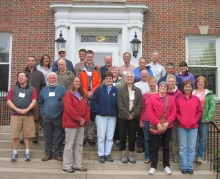You are here
25 New Keystone Cooperators trained at Harvard Forest

In late April, 25 community volunteers completed a three-day workshop at the Harvard Forest as part of the Massachusetts Keystone Program. The program trains forest landowners and community opinion leaders to be local advocates of conservation, and to help inform the land management and conservation decisions of their friends, neighbors, organizations, and communities.
The annual training covers subjects such as forest ecology and management, wildlife management, land protection, and community outreach. In exchange for the training and take-home resources, graduates of the program, called Cooperators, agree to return to their communities and volunteer at least 30 hours towards projects that promote conservation.
Past Keystone Cooperator projects have included permanent land conservation, initiating a forest landowner cooperative, promoting management on municipal and conservation lands, writing newspaper articles, hosting educational events, and improving their own properties for wildlife, recreation, and timber.
Since 1988, the Keystone Project has trained more than 450 community opinion leaders and landowners. In 2011, the network of Keystone Cooperators collectively volunteered over 37,125 hours to conservation-related activities (the equivalent of 18 full-time conservation positions), reached 12,669 people, and made 1,419 referrals to foresters, land trusts and other resources. Cooperators reported owning or being involved in the management decisions (e.g., land owned by a local ngo or municipality) on 89,329 acres of land.
The Keystone Project is organized by the University of Massachusetts Department of Environmental Conservation and UMass Extension, with funding support from the Harvard Forest, MA DCR, and the MA Chapter of The Nature Conservancy.
For more information on forest conservation or Keystone, contact:
Paul Catanzaro, Extension Assistant Professor; University of Massachusetts; 413 545-4839; cat@umext.umass.edu

